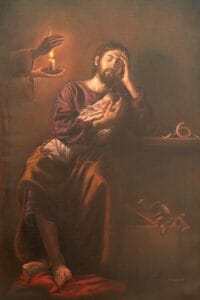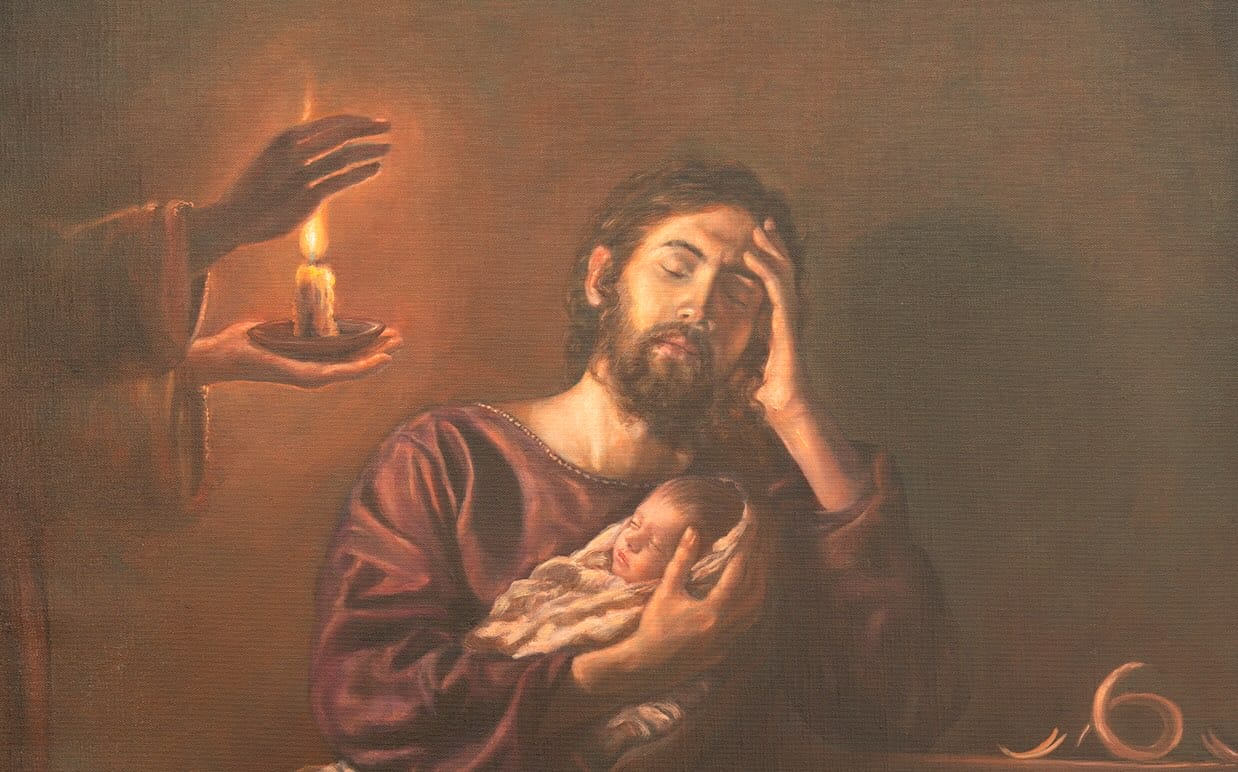Every March 19, the Church celebrates the Solemnity of St. Joseph. For the Augustinian Recollects it is a special day, having Joseph as a special protector of the Order, whose worship and devotion are part of the Augustinian Recollect spirituality.
On the occasion of this year’s celebration, the Prior General, Fr. Miguel Angel Hernandez, has addressed a letter to the Augustinian Recollect Family, which is reproduced below:
In the middle of the Lenten desert, as if it were an oasis, the figure of Patriarch Joseph, special protector of the Order, emerges discreetly. “Their worship and devotion, our Constitutions state, are part of Augustinian Recollect spirituality” (OAR Const., 80).
In this year in which we in the Order reflect on the little things, it is not difficult to find in Joseph many traits that show that his personality is forged and shaped by little things. Small, but no less important; I would even go so far as to say small, but essential and necessary. I focus on three: silence, discretion and obedience.
Silence is a virtue that is little or not valued at all nowadays, even when we come across a silent or silent person, the first thing we do is to ask him or his acquaintances directly if something is wrong, because in our society there is no place for silence. Silence is not understood. We like noise and making noise, we like to talk, even if we don’t have much to say, we like to talk, even if we don’t contribute anything. We have not kept a single word about Joseph, but his life, his attitudes and his behavior say it all. I would dare to say that we are words, poor castaways in a sea of words. We talk a lot, but our lives say little. Joseph, on the other hand, speaks nothing, but his life says it all. His life tells us that he is a man who knows how to listen to God and to people. His life tells us that he is a man obedient to God’s will and that he acts with total readiness and availability to do what God asks of him.

He is a man who works and earns his bread as a carpenter, with the effort and sweat of his brow; a man who takes care of his family and guards them from all dangers; a man who renounces his homeland and lives in itinerancy to save his little one and protect his family.
Joseph’s silence is a respectful silence at the service of listening, a silence that helps to look inward to meditate and to know God’s will. Pope Benedict XVI said “let us allow ourselves to be invaded by the silence of St. Joseph, the noise prevents us from hearing or perceiving the great truths of life”.
St. Joseph is also the discreet man, another of those virtues that is not fashionable in our society. If they sold discretion in stores, it would probably expire on the shelves, or if it were a perishable product it would decompose. There is no demand in the market for discretion and no supply good enough to provide an outlet for it. We don’t even want it for free. Generally, discretion is the fruit of spiritual maturity, which the patriarch Joseph evidently had. Just look at how he handled the situation of Maria’s pregnancy: no scandals and fuss, no exposing her to public scorn and leaving her in a bad light, there is no need for that. Complying with the law? Yes, but secretly and without publicity. Our society loves the media noise, it loves the spectacle and taking things out of context, we love criticism, discrediting and moral outrage, above respect for the dignity of people.
Joseph did not use discretion only in the matter of his wife’s pregnancy, but it was an attitude of life in all the moments of his history. Joseph decided to live his whole life in the shadows, in a discreet place, and to give Mary all the prominence she deserved. Joseph’s presence in the Holy Family gave an air of normality to a totally anomalous situation: Mary was his wife, but Joseph knew that she belonged entirely to God; Jesus calls him father, but he knows very well that he had nothing to do with her conception, and he was not even allowed to choose her name. The family of Nazareth looks like a normal family of humble and hardworking people, law-abiding: they circumcise the child, present him at the temple, go to the synagogue, make a pilgrimage to Jerusalem, work in a carpenter’s shop… a normal family, but totally special because it has been entirely designed by God. Joseph teaches us to be discreet, and to wait for God’s times in silence.
 The third virtue I would like to highlight in St. Joseph is that of obedience. We normally use obedience as a limit resource for extreme situations where we have to assume decisions external to us and that go against our desire or will. In reality, in Joseph obedience is also an attitude of life, which is lived in the little things of every day, and so it should also be for us, especially for religious.
The third virtue I would like to highlight in St. Joseph is that of obedience. We normally use obedience as a limit resource for extreme situations where we have to assume decisions external to us and that go against our desire or will. In reality, in Joseph obedience is also an attitude of life, which is lived in the little things of every day, and so it should also be for us, especially for religious.
Joseph’s obedience is based on a total trust in God; it is an obedience that does not seek many explanations, nor does it try to rationalize everything. In Joseph’s life there were no “buts” or “whys”. Joseph trusts God and knows very well in whom he has placed his trust. In reality, failures in obedience often expose our lack of faith.
Obeying is much more than an extreme resource for extreme situations. Obedience is living open to God’s plans and to the needs of men; it is knowing how to remove oneself from the center and to step aside; it is living by faith; it is dying to oneself and putting what is common before one’s own; it is docility to what God manifests to us through normal mediations; it is renouncing to have to understand everything and to want to have everything very clear, abandoning oneself to God, who knows what we do not know. It is to understand that God has a much broader vision than ours.
In short, Joseph’s life tells us that it is not so important to do “great things” but to do well the task at hand.
“And since the whole world looks at you and wonders, tell how it is to be holy and carpenter, glory and wood, grace and eagerness, to have mercy on God and scarce bread” (hymn of vespers).
Rome, March 17, 2024
Fr. Miguel Ángel Hernández Domínguez


